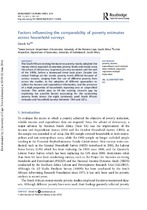| dc.contributor.author | Yu, Derek | |
| dc.date.accessioned | 2021-03-08T09:16:18Z | |
| dc.date.available | 2021-03-08T09:16:18Z | |
| dc.date.issued | 2016 | |
| dc.identifier.citation | Yu, D. (2016). Factors influencing the comparability of poverty estimates across household surveys. Development Southern Africa ,33( 2),145–165 | en_US |
| dc.identifier.issn | 1470-3637 | |
| dc.identifier.uri | https://doi.org/10.1080/0376835X.2015.1120646 | |
| dc.identifier.uri | http://hdl.handle.net/10566/5971 | |
| dc.description.abstract | The South African existing literature on poverty mainly adopted the
money-metric approach to examine poverty levels and trends since
the advent of democracy. In general, poverty increased until the end
of the 1990s, before a downward trend took place. Despite the
robust findings on the trends, poverty levels differed because of
various reasons, ranging from the use of different poverty lines
across the studies, to the adoption of different approaches to
collect the income and expenditure information, and the presence
of a high proportion of households reporting zero or unspecified
income. This article aims to fill the existing research gap by
explaining the possible factors accounting for the contrasting
poverty levels across the eight commonly used South African
censuses and household surveys between 1993 and 2012. | en_US |
| dc.language.iso | en | en_US |
| dc.publisher | Taylor & Francis group | en_US |
| dc.subject | Poverty | en_US |
| dc.subject | Income | en_US |
| dc.subject | Expenditure | en_US |
| dc.subject | Recall method | en_US |
| dc.subject | Sequential regression | en_US |
| dc.title | Factors influencing the comparability of poverty estimates across household surveys | en_US |
| dc.type | Article | en_US |

